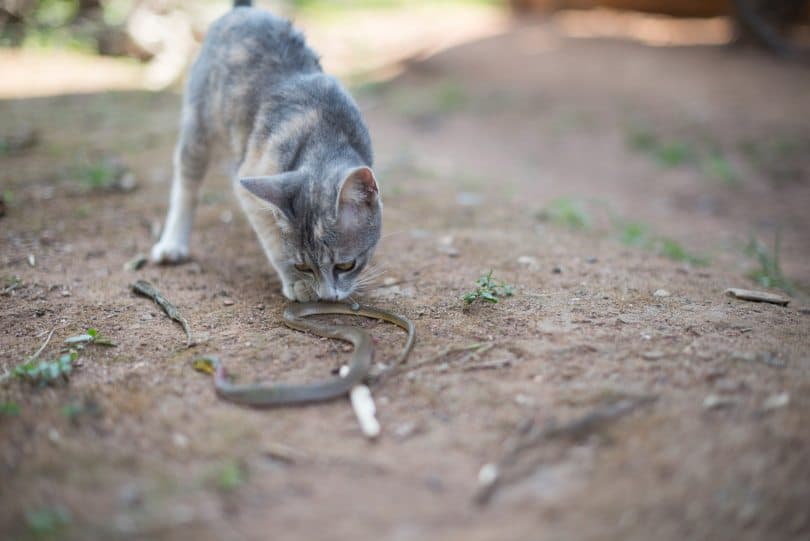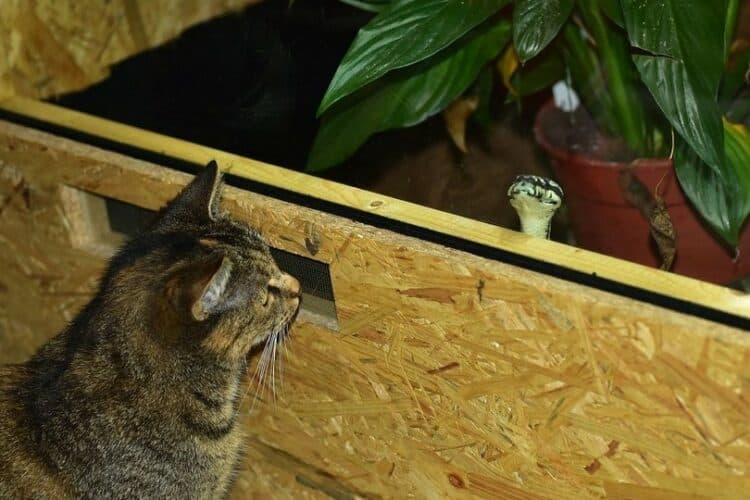You may have seen some comical videos of cats flying away from cucumbers floating around the internet. People have posited that this fear comes from a natural, biological aversion to things shaped like snakes, and veterinarians and other animal science experts have largely backed this conclusion.
However, that doesn’t mean cats are afraid of snakes. In fact, cats have been known to hunt, kill, and eat snakes when presented with an opportunity to. Here’s what you need to know about the relationship between cats and snakes.
Cats: Predator and Prey
While humans are quick to point out members of the food chain as “predators” or “prey,” the vast majority of the food chain is both predator and prey. Only the very top and bottom of the food chain tend to be exclusively one or the other.
Cats and snakes are no exception to the rule. Cats have been known to hunt and kill snakes. One entry in the letters to the editors of the journal Science details the story of the writer’s cat, an indoor/outdoor hybrid cat that occasionally disappears into the forest and returns with a freshly killed snake that she would feast upon.
At first, her owners were mystified about where she was getting the snake carcasses. While Occam’s Razor states that the most logical answer is that she was hunting them, the owners had never witnessed the cat chasing the snakes, and cats aren’t exactly well known for their snake-hunting abilities.
It wasn’t until the owners found a snake in their hen coop that they got an answer to their question. At the same time, try to figure out how to best remove the snake from the hen coop without harming the snake or the hens. In comes the cat who valiantly throws herself into the heat of battle.
The writer recounts watching the showdown between the cat and the snake, with the cat showing apparent prowess and practice in the art of killing snakes. Ultimately, the cat walked away victorious, holding the limp snake in her jaws, and the hens were safe.
This story shows us that domestic cats are able and willing to hunt and attack snakes when the opportunity presents itself. This is far from the natural predator status we see with cats and rodents. Instead, these animals are opportunistic predators.

Opportunistic Predators: Why Cats Are Afraid of Cucumbers
A lot of the animals we associate with foraging are opportunistic predators. Squirrels and chipmunks are known to invade unattended bird nests and steal eggs or even prey on young chicks. But some predators are known to hunt other predators when they can catch them unaware.
Cats and snakes have a reciprocally opportunistic predator relationship, meaning both creatures are willing to hunt each other in specific circumstances. This relationship may be related to the competition between the two species for rodent populations or may simply be a factor of a need for animal proteins and the subsequent presence of such.
Snakes will generally only hunt cats that are small and defenseless. So, your cat is so afraid of cucumbers because the only natural way a snake would approach a cat is to hunt the cat. Your cat misidentifies the cucumber as a snake but correctly assumes that the snake is privy to information your cat doesn’t have. Thus, the cat makes a daring getaway by violently launching itself into the air.
However, cats and snakes will reciprocally avoid each other so long as all their basic needs are met. Depending on the external circumstances, they view the other as a potential predator and potential prey.
Final Thoughts
While the videos of cats taking off like spaceships when they see a cucumber, cats and snakes aren’t destined, mortal enemies. Your cat is just acting in self-defense based on a biological predilection to avoid things that look like potential predators. Cats will also avoid things that feel alien or unnatural to them, like counters covered in tin foil. So, the reaction’s not entirely unique to cucumbers and snakes.
Featured Image Credit: Pixabay














